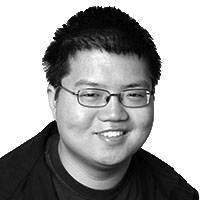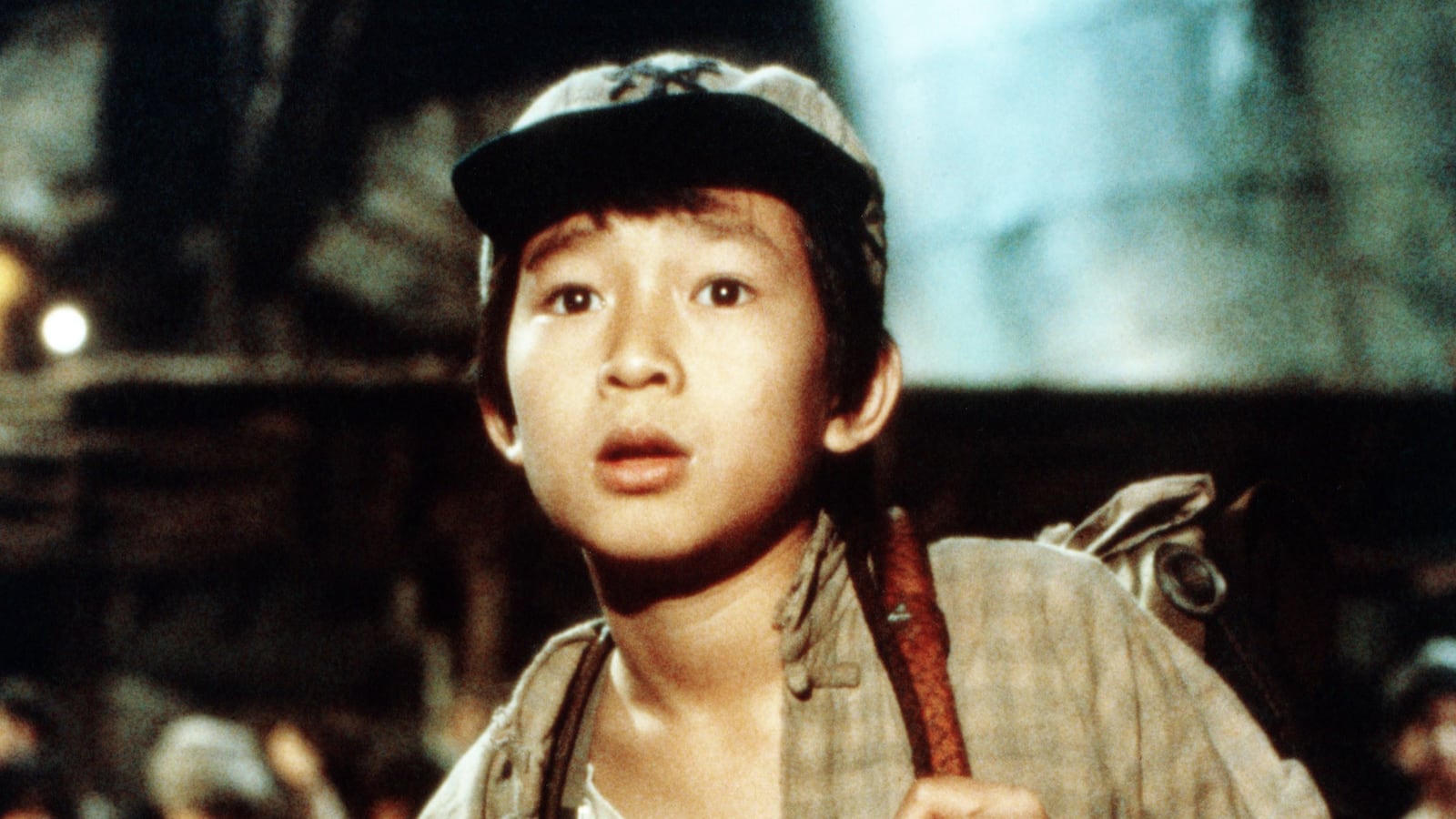One of the things we Asians complain about when we get together at Asian Club with our white cardboard pails of Asian takeout to watch shows on our Asian-manufactured TV is that when it comes to Asian celebrities, there’s awfully slim pickings.

Most of the Asian actors—all four of them—that you’ve probably heard of have already weighed in on the #CancelColbert kerfuffle, and 25 percent of the Asian actors that you’ve probably heard of (B.D. Wong) has actually appeared on The Colbert Report to make fun of the whole thing.
So why not throw my hat into the ring, as an Asian semi-quasi-celebrity, by which I mean a Chinese guy who got a lot of money and attention for winning a game show?
Look, I probably wouldn’t get along with Suey Park in real life. In fact one of my worst nightmares is of her ever being in my house. She would probably snap at me for owning a Firefly box set and agreeing to do Chinese-accented voiceovers for commercials to please my corporate masters—and worst of all for currying favor from the White Establishment by tweeting “I think #CancelColbert is dumb.” Then my wife would probably get upset, and then Suey would probably say something about “drinking white woman tears,” and then I’d probably kick my chair over and the evening would just go to hell from there.
Trust me when I say I’m not currying favor from White America by saying this. In fact, a significant portion of Suey Park’s disturbingly loyal army of retweeters/rebloggers/petition-signers is White America, and I’m really not looking forward to reliving the experience of angry white “anti-racists” call me a banana to my face and not seeing the irony. But it has to be said, on behalf of my friends, my family and every non-Tumblr non-social-justice-warrior American of Asian descent I’ve personally spoken to about this: Suey Park is crazy. She does not represent us. She does not speak for us. She doesn’t speak for anyone except her fellow denizens of Angrytweets, USA, a community whose sole import is random entertainment news and whose sole export is intoxicating outrage.
And yet, I like her. I compulsively read her Twitter feed. I smile a little when I see her pop up in the news and someone links me another incoherent critical-theory-jargon-laced rant of hers on Facebook.
I’m glad she’s out there. Because Asians need more villains.
You know what I just said about us wanting more Asian celebrities? This often gets rephrased as we want “more Asian heroes,” but this is not actually true. We have plenty of Asian “heroes.” Lord knows I latched on to my fair share growing up. These Asian heroes ran the gamut from lovably goofy techie nerds like Data in The Goonies to lovably enlightened martial-arts mentors like Mr. Miyagi in The Karate Kid to lovably campy helmsmen of the USS Enterprise like Lt. Sulu from Star Trek. There were plenty of lovable, responsible, industrious “good role models” for my parents to try to push on me. I got the sense growing up that their ideal kid would be someone with the quiet, charming naiveté of Data and the calm equanimity and unwavering discipline of a Master Po and the impeccably coiffed hair of George Takei.
The problem was that these “good role models” were freaking boring. Being the reliable steady source of clever ideas and technical know-how and good-natured earnestness and inner peace and all that shit—who can relate to that? That wasn’t any kind of hero I could identify with growing up—I was brash, reckless, selfish, unbalanced and my hair was disastrous beyond remediation, and I had no interest in loyally supporting or nurturing other people on their spiritual journeys.
I didn’t want to be Data, I wanted to be Mouth. I didn’t want to be Mr. Miyagi or Master Po, I wanted to be Daniel-san or Kwai Chang Caine, the troubled young men chafing under their wise Asian masters’ infuriating serenity. And except for the one memorable episode where he got to rip off his shirt, wave a sword around and act like a deranged lunatic, I could never come up with a reason why anyone would ever prefer to be the reliable Lt. Sulu rather than the brashly hubristic Captain Kirk.
The whole story of my particular subcultural cohort of Asian-Americans is the story of how we grew up silently fuming when our white teachers said, “The wonderful thing about the Japanese is that their word is their bond” or “If only we took hard work as seriously in America as they do in China.” Of our faces burning with shame at straight-A report cards and piano and violin recitals and being paraded around by our teachers as a “good example.” Of hating every moment of being the “model minority,” not just because doing homework all weekend when your friends are out playing is a bummer, not just because living up to that straight-A record is a ton of pressure that will lead to you developing peptic ulcers and persistent insomnia at the age of 22—all of those things are real concerns, but the big one is just that even if you succeed at living up to those “model minority” standards and being Practically Perfect in Every Way, where does that leave you?
Perfect people are freaking boring. Perfect people don’t get to be the protagonist of the story, because you can’t tell a story about perfect people. Perfect people end up the side character, the rival, or the best friend, or the wise old mentor. But no one is interested in what happens to them.
This is, of course, not a new observation. The most famous of Suey Park’s pre-#CancelColbert hashtags was #NotYourAsianSidekick, and the Asian Sidekick is a variant of the more widely-acknowledged trope of the Magical Negro, the trope wherein Morgan Freeman’s fictional life consists of him apparently sitting around smiling beatifically and waiting for a troubled white man to guide to his destiny. And it’s not a trope that’s entirely borne of lazy white writers and producers finding ways to throw in a token minority without having to give the actor top billing. We have agency in creating these myths; we’ve been complicit in creating these identities for ourselves, as a form of defense. Even now in 2014 there are people making a writing career out of tirelessly reconstructing and reselling the “model minority” myth in new packaging.
I can’t really blame them. Because, after all, when you’re still fighting the basic battle for basic civil rights—to not be lynched in a massive riot with impunity, to not be legally banned from the country, to not be thrown into internment camps without trial—then being thought of as hardworking, intelligent, loyal and trustworthy as opposed to a subhuman invading monster that must be stamped out seems like a pretty good deal.
My parents certainly didn’t really get why I was so ticked off at being thought of as a good student and a future model employee, and would rather be seen as a complex, sensitive rebel with a dark side. And I admit I look back on my teenage self and think a lot of my angst sounds like an Onion article. But this has been a perennial struggle, and one that other ethnicities have played out as well. Bill Cosby could’ve been my own dad when he started throwing up his hands in exasperation at younger black audiences who spurned the upper-middle-class Huxtable ideal he so carefully crafted and presented in the 1980s for NWA and In Living Color in the 1990s.
Just like my dad doesn’t understand why my favorite thing about Glee’s first season was that the fat, loutish, belligerent, washed-up ex-jock football coach—an otherwise unremarkable character in every way—had the surname Tanaka. Why so many of Lost’s Asian fans, like me, were fascinated with the character of Jin—an often-abusive husband with an ugly criminal past who nonetheless had a heart of gold, a character who’d be a dime a dozen in an actual Korean soap opera but on a top-rated American primetime TV show was like cold water in the desert. Why the best thing I have seen on the Internet lately is David Chu, a character on the Amazon original webseries Betas who’s a Natty-Ice-swilling visor-wearing fratboy asshole. Arrogant, smug, mercurial and just plain cringeworthily douchey—everything the good-naturedly earnest Asian sidekicks of the world are not.
Or, well, why play coy about it? I don’t need to cite pop-culture examples of Asian audiences lapping up an Asian douchebag for being a douchebag. I lived it. In my erstwhile fifteen minutes of game show notoriety, almost from the very beginning angry critics were telling me I was disrespectful, smug, greedy, unpleasant… and from the very beginning random Asian viewers from all over the country were flocking to my side, giving me their support, telling me I was awesome, calling me their hero.
Why? I doubt it’s because winning a lot of money on a game show and then not apologizing for it is inherently inspiring. I think it’s because when you’ve spent your whole life as a “model minority” the desire to indulge some other dimension of your personality—to be willing to play the “thug,” the “rebel,” the “villain”—can be overpowering. Because, after all, real people, three-dimensional people, the kind of people you could actually identify with and be friends with and fall in love with, aren’t always nice. Sometimes they’re short-tempered, or rude, or selfish, or mean. And any population of real three-dimensional people is going to have a spectrum of nice people and mean people, heroes and villains, pillars of the community and jerks.
So, you know, I think Suey Park falls pretty far on the “jerk” end of the scale. But I’m glad she’s out there. She defines one end of the spectrum. She’s a sign that the Overton Window for Asian-American representation in public has widened even during my lifetime, and is only getting wider.
Don’t get me wrong, I heave a heavy sigh when I see another Hashtag War brewing on the Twitter horizon and I get even more depressed when people respond to Park and her followers with misogyny and death threats and general nastiness and the whole thing makes me feel like throwing my computer out a window. But I’m glad, nonetheless, that it’s happening. That a controversy-chaser like Park or Armond White or whoever the viral troll of the week is can do what they do without fear of sparking violent reprisals against an entire group of people. That Park can spit over-the-top fire and venom at the white cishet male oppressor and I’m not sitting here worried about bloody pogroms—and, for that matter, that I too can sit here and kind of be a snarky jerk to Park and not get carted off for re-education by the Asian Police.
I’m glad that we’re increasingly living in a world where nice people can be nice people and jerks can be jerks and game show villains can be game show villains without the need to be a “credit to your race.” That, slowly, haltingly, through a lot of debating and arguing and fighting and hashing tough shit out, we’re finding the freedom to just be ourselves.





